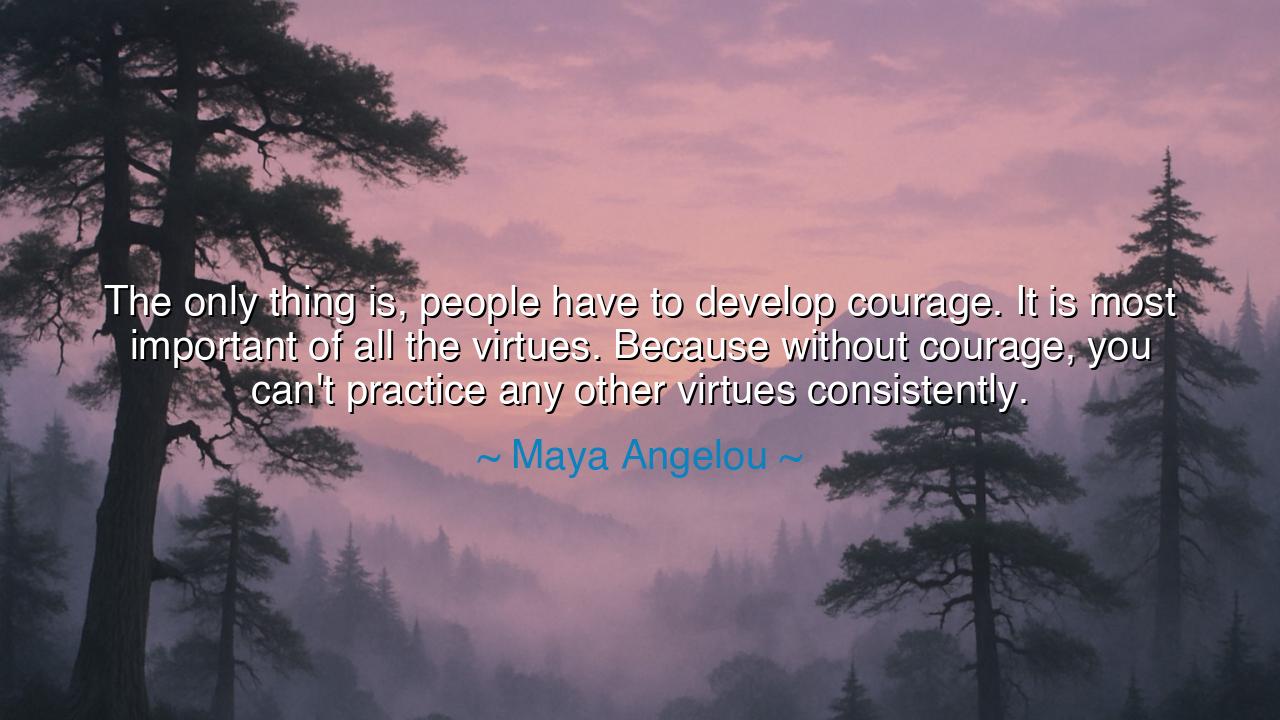
The only thing is, people have to develop courage. It is most
The only thing is, people have to develop courage. It is most important of all the virtues. Because without courage, you can't practice any other virtues consistently.






“The only thing is, people have to develop courage. It is most important of all the virtues. Because without courage, you can’t practice any other virtues consistently.” So spoke Maya Angelou, a woman whose voice was thunder and balm in equal measure—poet, prophet, and mother to the wounded spirit of humanity. Her words rise not merely as counsel, but as a declaration carved in the stone of human experience. She understood that courage is not a single act of boldness, but the silent heartbeat beneath all goodness; the foundation upon which every noble deed is built.
From the dawn of time, humankind has praised virtue—kindness, justice, honesty, compassion, and love—as the pillars of moral life. Yet Angelou, in her great wisdom, saw what many overlook: these virtues are fragile without the spine of courage. For to be honest in a world that rewards deceit, to be kind in an age of cruelty, to be just when injustice brings power—each demands bravery. Without it, virtue remains an idea, a dream that falters when tested by the winds of fear.
Consider the life of Rosa Parks, who, on a quiet December evening in Montgomery, refused to surrender her seat to prejudice. That simple act—small in motion, vast in meaning—was courage incarnate. Her heart must have trembled; her future hung in peril. Yet she stood firm, not with sword or shield, but with dignity. Because of her courage, the virtues of justice and equality found breath and voice. Without it, her belief in fairness would have remained a silent prayer. Through her, we see Angelou’s truth: courage is the lamp that gives light to all virtues.
So too did Mahatma Gandhi, frail in body but unbreakable in spirit, wield courage as his greatest weapon. Against an empire that ruled the world, he fought not with hatred, but with the power of truth and nonviolence. It was his courage that allowed him to practice the virtues of peace and forgiveness even when violence tore through his homeland. Without courage, his dream would have withered in fear. With it, he moved the soul of nations.
In every age, fear is the shadow that trails the human heart. Fear of loss, fear of rejection, fear of pain, fear of standing alone. It is courage—that quiet, stubborn flame—that dispels this shadow. And when it burns within us, even faintly, it calls forth the best of who we are. With courage, we dare to love those who hurt us, to tell truths that may cost us comfort, to walk the harder road when the easier path beckons.
To live by Angelou’s wisdom is to cultivate courage daily, like tending a sacred fire. One must begin with small acts—speaking truth when it trembles on your lips, defending the weak when silence feels safer, daring to dream when failure seems certain. Each act strengthens the heart until it becomes unshakable. Then, and only then, can virtue become steadfast, unyielding to circumstance.
The lesson is clear as sunlight after storm: Courage is the root from which all goodness grows. To possess it is to live with integrity even when unseen, to act with kindness even when unreturned, to remain just even when justice costs dearly. The ancients would call such a person noble of soul. Angelou would call them truly human. So, my child, kindle your courage as you would guard your life’s flame—feed it with faith, shield it with hope, and let it illuminate the path of every virtue you strive to live.






AAdministratorAdministrator
Welcome, honored guests. Please leave a comment, we will respond soon